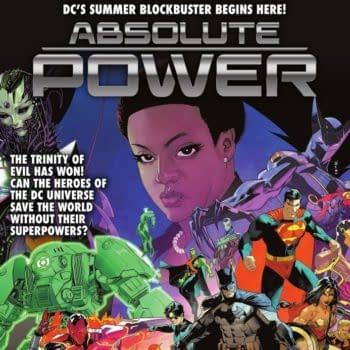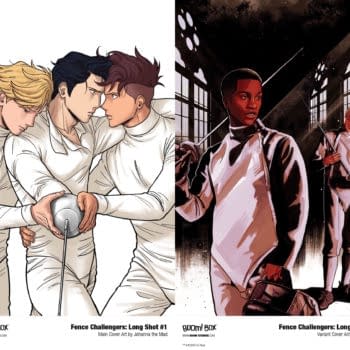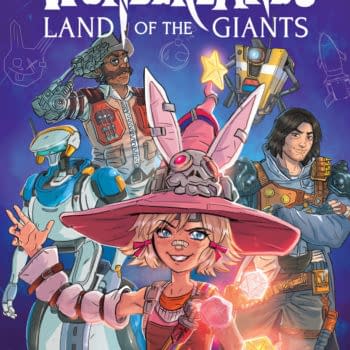Posted in: Comics, Recent Updates | Tagged:
Talking To Ruth Fletcher Gage About Bathroom Boycotts And Bernie Bros

Recently, she has become notable on social media opposing attempts by comic book creators to promote boycotts of Heroes Con, a show in North Carolina, over the state's infamous bathroom gender laws, seen as targeting the trans community. Ruth was vociferous in her defense of the show, claiming Heroes Con as a LGBT friendly show, opposed to the state legislation and stating a far more liberal bathroom policy for the show. And that boycotts would harm the very cause that people were fighting for. A Democrat political operative for her whole life, including working for political bodies in Washington DC, she's also been fervently campaigning for Hillary Clinton, while seemingly opposed to anyone who suggests they'd prefer to vote for Bernie Saunders, using "Bernie Bros" as a common insult. She is also committed to running for Congress in the future as well.
I had the chance to ask her a few questions.
Ruth, you've recently talked about what you see as the danger of boycotts over North Carolina's recent controversial gender bathroom laws, and how the can affect the innocent. even those who are very much against the laws themselves, such as Heroes Con. Can I ask, isn't that the case with all boycotts? Whether against bathroom laws or against South African apartheid?
Ruth: I'd like to say that this conversation was started because I own a business in North Carolina where a new discriminatory law was just passed to limit LGBTQ rights (as well as the rights of women, the elderly, veterans and people with disabilities) and I was concerned about people boycotting pro-LGBTQ small businesses in the state without fully thinking through the consequences.
There will always be some innocent people and businesses hurt during boycotts; but I think the best boycotts limit the damage done to the people who are fighting on the ground. They don't shoot their own soldiers, so to speak. In NC, Equality NC has produced a list of businesses that support LGBTQ rights and they are encouraging people to continue to support these businesses from inside the state and out.
It's called a buycott–buy from the businesses that are fighting from within, but boycott the state. The state, after all, is the one that passed the discriminatory law. The ultimate goal should be to oust the politicians who passed the law and repeal the law, restoring rights back to those who lost them. Small businesses often don't have the ability to lose a large amount of money and survive–and if all the pro-LGBTQ small businesses in NC close down, what will that mean for the cause?
Another way to do this is to continue whatever business you have in the state you are boycotting and donate the proceeds of your business (or some of the proceeds) to an organization that is fighting the fight you care about within that state. This approach requires more time and research, of course, but it ends up allowing the boycott to work on different levels more effectively.
You've talked about running for Congress, yes your on-line invective, calling out people as "Bernie Bros" – as if that is necessarily a bad thing – looks needlessly divisive. Is the real enemy Trump? While it is unlikely at this stage, if Bernie was the Democrat nominee, would you vote for him?
Ruth: I am a life long Democrat and a Hillary supporter, but I would absolutely vote for Bernie if he was the nominee (although, since he is currently over 2.5 million votes behind Hillary, I would question how he could accomplish that). And no, calling out Bernie Bros, who have used derogatory language, name-calling and threats online, much in the same way the perpetrators of #gamergate did, is not divisive. They are divisive. There is never a problem with honest discussion and legitimate questioning of political candidates–we should do that every opportunity we get. But there is a difference between questioning and debate–and bullying and harassment. Bullying and harassment are done simply to intimidate people. To make them afraid to speak up. That is not healthy for either party. As we move forward in this election, everyone should be concerned about treating each other with respect.
You've talked about screencapping the posts of people who disagree with you, talking about how posters' employers might like to see them. Could you see how such posts could be used to weaken you? Or are we in a new Trump age where this kind of thing doesn't seem to matter anymore?
Ruth: I screencap contentious arguments because I like a factually accurate accounting of the debate–I don't do it in a threatening way. I'm completely up front about it. But, I have also spent most of my life in politics one way or another and I am very aware of potential consequences. Everyone should be conscious of how they treat others and the perception of how they treat others. It's 2016.
Captain Marvel #7 is published on the 29th June.











